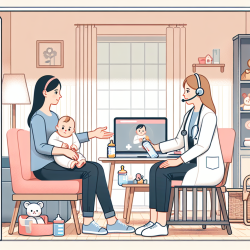Introduction
The first years of life are critical for a child's cognitive, social, and emotional development, with long-term implications for educational and health outcomes. The environment plays a crucial role in facilitating or hindering this development, especially in low-income settings where resources are limited. A recent study titled A randomized controlled trial testing the efficacy of a Nurse Home Visiting Program for Pregnant Adolescents explores the impact of the Primeiros Laços program on adolescent mothers and their children in São Paulo, Brazil.
Study Overview
The study conducted a randomized controlled trial with 80 adolescent mothers, divided into an intervention group receiving the Primeiros Laços program and a control group receiving standard healthcare. The program involved home visits by trained nurses from pregnancy until the child reached 24 months, focusing on health, parenting skills, and environmental support.
Key Findings
- Expressive Language Development: The intervention significantly improved children's expressive language skills (coefficient = 0.89, p = 0.014), with a small to moderate effect size (Cohen’s d = 0.37).
- Maternal Responsivity: Mothers in the intervention group showed enhanced emotional and verbal responsivity (coefficient = 0.97, p = 0.002), indicating improved mother-child interactions.
- Daily Stimulation Opportunities: The program increased opportunities for variety in daily stimulation (coefficient = 0.37, p = 0.009), which is crucial for child development.
Implications for Practitioners
Practitioners working with adolescent mothers can draw several insights from this study:
- Focus on Language Development: Emphasizing expressive language skills can have a significant impact on a child's overall development. Practitioners should incorporate language-rich activities in their interventions.
- Enhance Maternal Responsivity: Training programs that improve maternal responsivity can foster better mother-child interactions, leading to improved developmental outcomes.
- Provide Diverse Stimulation: Encouraging a variety of daily activities can enhance cognitive and emotional development. Practitioners should guide mothers in creating a stimulating home environment.
Encouragement for Further Research
While the Primeiros Laços program shows promise, the study's limitations, such as a small sample size and dropout rates, suggest the need for further research. Future studies should explore the long-term effects of such interventions and assess their scalability in different settings.
To read the original research paper, please follow this link: A randomized controlled trial testing the efficacy of a Nurse Home Visiting Program for Pregnant Adolescents.










